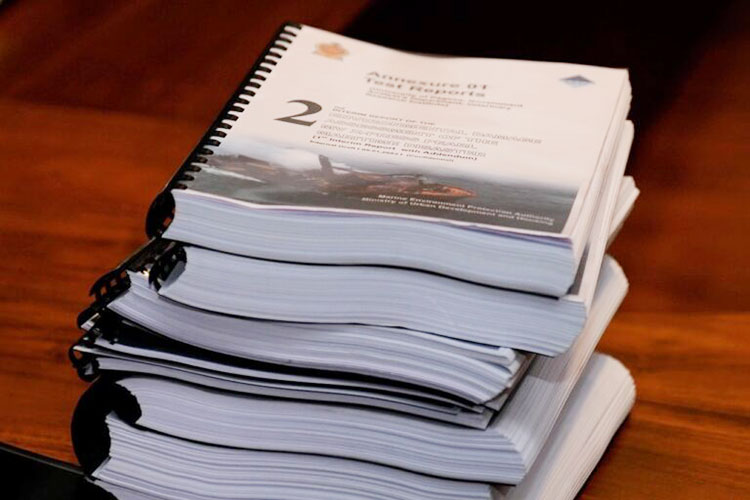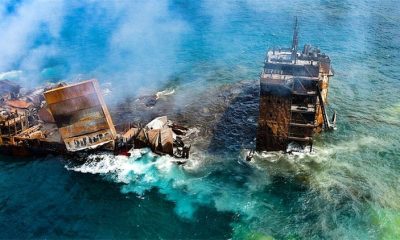News
Activists slam Lanka’s bid to seek X-Press Pearl compensation in Singapore

(Mongabay) Environmental activists have questioned the decision to file for compensation in Singapore instead of Sri Lanka for a 2021 ship sinking that became the worst maritime disaster in the country’s history, saying there’s less likelihood of winning adequate compensation overseas.
The Sri Lankan government is filing a lawsuit in Singapore for compensation nearly two years since the worst maritime disaster in the country’s history. But activists say it waited too long and would have stood a better chance of adequate compensation had the lawsuit been filed in Sri Lanka.
Speaking before parliament on April 25, Justice Minister Wijeyadasa Rajapakshe confirmed that the Department of the Attorney General had filed legal action before Singapore’s International Commercial Courts (SICC) to claim compensation for the extensive environmental damage caused by the burning and sinking of the Singapore-flagged freight ship the X-Press Pearl in May 2021.
“The decision to lodge the lawsuit in Singapore courts was done in consultation with a group of independent local and international lawyers as Singapore’s legal system is better equipped to handle this type of complex maritime legal battles,” Rajapakshe said.
The sinking of the fire-stricken ship, carrying tons of plastic pellets and toxic chemicals, is considered Sri Lanka’s worst maritime disaster to date. The plastic pellets, known as nurdles, fouled an extensive arc of Sri Lanka’s southwestern shore, with volunteer crews hard at work cleaning up the billions of grain-sized pellets for months on end.
A 40-member expert committee convened by the Marine Environment Protection Authority (MEPA) to assess the environmental damage issued its second interim report in January this year, in which it put a price on the disaster: $6.4 billion.
Maritime rules require a claim for compensation to be filed within two years of the occurrence of the accident. The Singapore-flagged X-Press Pearl caught fire in Sri Lankan waters on May 20, 2021, and sank several days later. But the long wait without filing action has caused anxiety among activists, who have criticized the government for not moving fast enough.
Part of the delay was due to the complexity of the environmental assessment. There was very little baseline data for the expert committee to compare against, especially in the maritime context, which required them to assess damage scenarios over the short, mid- and long terms, said Dharshanie Lahandapura, former chair of the MEPA.
The group of experts continues to monitor the impacts of pollution caused by the disaster. The National Aquatic Resources Research and Development Agency (NARA) is also monitoring impacts to the marine environment, while the Department of Wildlife Conservation (DWC) is assessing the fallout on marine life, Lahandapura told Mongabay.
Based on the future findings, there could be more claims, given that the nurdles and other chemicals are likely to have long-lasting effects, Lahandapura said.
But waiting until just weeks before the two-year deadline “is unacceptable as the strategy should be to file it first without waiting for the outcome of the expert committee evaluation,” said Ravindranath Dabare, a lawyer and chair of the Centre for Environmental Justice (CEJ), a Colombo-based NGO.
“Within the first week of the X-Press Pearl disaster, CEJ filed the first case in local courts to push the authorities to take necessary actions, and subsequently two more cases to expedite the proceedings as the work was lagging,” Dabare told Mongabay.
The X-Press Pearl accident occurred within a few kilometers of the Colombo coast, well within Sri Lanka’s jurisdiction. That renders “the shipping company … a part of our local case and their representatives do participate in the court hearings, so there was no barrier to filing a case in Sri Lankan courts,” Dabare said.
He added the evidence is available in Sri Lanka, as are the experts who conducted the environmental damage assessment. Hiring Singapore-based lawyers will incur a higher cost, in addition to the cost of overseas travel — something Sri Lanka can ill afford as it reels from the worst economic crisis in its history, Dabare said.
“The existing Marine Environment Protection Act and the general law have provisions that enable Sri Lanka to file the lawsuit locally,” said Dan Malika Gunasekera, an expert on international maritime law.
He also noted there’s a limit to the amount of compensation that Sri Lanka can claim when lodging the case in Singapore.
“We must get the compensation from the insurer of the X-Press Pearl, who is in the United Kingdom, and on this basis, it may be better to file in the U.K. than Singapore,” Gunasekera told Mongabay.
Even then, the U.K. would also limit compensation to 19.5 million pounds ($24 million). In Sri Lanka, however, there would be no such cap.
Justice Minister Rajapakshe said the government would appoint a British lawyer to negotiate the compensation limitation set in the U.K. for the insurers. He reiterated the position that prospects for a favorable outcome are better in those overseas courts than in Sri Lanka.
Rajapakshe pointed to the case of the oil tanker New Diamond, which caught fire off Sri Lanka’s eastern coast about eight months before the X-Press Pearl incident. Three compensation claims were filed in Sri Lanka’s commercial courts in the New Diamond case, but they came up against various constraints. This, Rajapakshe said, influenced the decision to take the X-Press Pearl case before the Singapore courts.
Ayesh Ranawaka, a maritime expert and former commissioned officer with the Sri Lankan Navy, agreed that the Singapore courts represented a better chance of getting justice in the X-Press Pearl case. This doesn’t mean the local justice system is weak, he told Mongabay, just that there are too many disagreements at the local level about how to proceed.
If the Sri Lankan position is divided, the other party can take advantage of that, Ranawaka said. But when filing in Singapore, the Sri Lankan parties would at least come to a common position. They would also have international laws to fall back on, so the opportunity for justice may be higher, Ranawaka said.
As the government and activists debate what should be the correct course of action to demand compensation, it’s clear that Sri Lanka needs a clear strategy to handle these kinds of marine disasters, Ranawaka said.
“Sri Lanka needs to look beyond the X-Press Pearl incident and treat it as an eye-opener to ensure a proper maritime policy to avoid future mishaps,” he said.
News
US sports envoys to Lanka to champion youth development

The U.S. Embassy in Colombo welcomed the U.S. Sports Envoys to Sri Lanka, former National Basketball Association (NBA) and Women’s National Basketball Association (WNBA) players Stephen Howard and Astou Ndiaye, from June 8 through 14.
The Public Diplomacy section of the U.S. Embassy said that it would launch a weeklong basketball program intended to harness the unifying power of sports, made possible through collaboration with Foundation of Goodness and IImpact Hoop Lab.
While in Sri Lanka, Howard and Ndiaye, both retired professional basketball players, will conduct a weeklong program, Hoops for Hope: Bridging Borders through Basketball. The Sports Envoys will lead basketball clinics and exhibition matches and engage in leadership sessions in Colombo and Southern Province for youth aged 14-18 from Northern, Uva, Eastern and Western Provinces, offering skills and leadership training both on and off the court. The U.S. Envoys will also share their expertise with the Sri Lanka Basketball Federation, national coaches, and players, furthering the development of basketball in the country. Beyond the clinics, they will collaborate with Sri Lankan schoolchildren to take part in a community service project in the Colombo area.
“We are so proud to welcome Stephen and Astou as our Sports Envoys to Sri Lanka, to build on the strong people-to-people connections between the United States and Sri Lanka,” said U.S. Ambassador Julie Chung. “The lessons that will be shared by our Sports Envoys – communication, teamwork, resilience, inclusion, and conflict resolution – are essential for leadership development, community building, equality, and peace. The U.S. Sports Envoy program is a testament to our belief that sports can be a powerful tool in promoting peace and unity.”
News
Rahuman questions sudden cancellation of leave of CEB employees

SJB Colombo District MP Mujibur Rahuman in parliament demanded to know from the government the reasons for CEB suspending the leave of all its employees until further notice from Thursday.
MP Rahuman said that the CEB has got an acting General Manager anew and the latter yesterday morning issued a circular suspending leave of all CEB employees with immediate effect until further notice.
“We demand that Minister Kanchana Wijesekera should explain this to the House. This circular was issued while this debate on the new Electricity Amendment Bill was pending. There are many who oppose this Bill. The Minister must tell parliament the reason for the urge to cancel the leave of CEB employees,” the MP said.However, Speaker Mahinda Yapa Abeywardena prevented Minister Wijesekera responding to the query and said that the matter raised by MP Rahuman was not relevant.
News
CIPM successfully concludes 8th Annual Symposium

The Chartered Institute of Personnel Management (CIPM) successfully concluded the 8th Annual CIPM Symposium, which took place on 31st May 2024. Themed “Nurturing the Human Element—Redefining HRM in a Rapidly Changing World,” the symposium underscored the pivotal role of human resource management (HRM) in today’s dynamic global landscape. Since its inception in 1959, CIPM has been dedicated to advancing the HR profession through education, professional development, and advocacy, solidifying its position as Sri Lanka’s leading professional body for HRM.
Ken Vijayakumar, the President of the CIPM, graced the occasion as the chief guest. The symposium commenced with the welcome address by the Chairperson, Prof. Arosha Adikaram, followed by the Web Launch of the Symposium Proceedings and Abstract Book by the CIPM President. The event featured distinguished addresses, including a speech by Chief Guest Ken Vijayakumar, President of CIPM, and an address by Guest of Honor Shakthi Ranatunga, Chief Operating Officer of MAS Holdings Pvt. Ltd., Sri Lanka.
The symposium also featured an inspiring keynote address by Prof. Mario Fernando, Professor of Management and Director of the Centre for Cross Cultural Management (CCCM) at the University of Wollongong, Australia.
Vote of Thanks of the inauguration session was delivered by Dr. Dillanjani Weeratunga, Symposium Co-chair.
The symposium served as a comprehensive platform for researchers to present their findings across a wide range of critical topics in HRM. These included Cultural Diversity and Inclusion, Talent Development and Retention, Ethical Leadership and Corporate Social Responsibility, Adapting to Technological Advancements, Mental Health and Well-being at Work, Global Workforce Challenges, Employee Empowerment, and Reskilling and Upskilling.
The plenary session was led by Prof. Wasantha Rajapakse. Certificates were awarded to the best paper presenters during the valedictory session, followed by a vote of thanks delivered by Kamani Perera, Manager of Research and Development.
The annual symposium of CIPM was a truly inclusive event, attracting a diverse audience that spanned undergraduates, graduates, working professionals, research scholars and lecturers. This widespread interest highlights the symposium’s significance in the field of HRM, offering a unique opportunity for everyone to network and learn from scholarly brains.The CIPM International Research Symposium was sponsored by Hambantota International Port, Sri Lanka Institute of Information Technology (SLIIT), E B Creasy & Co. PLC, and Print Xcel Company.














